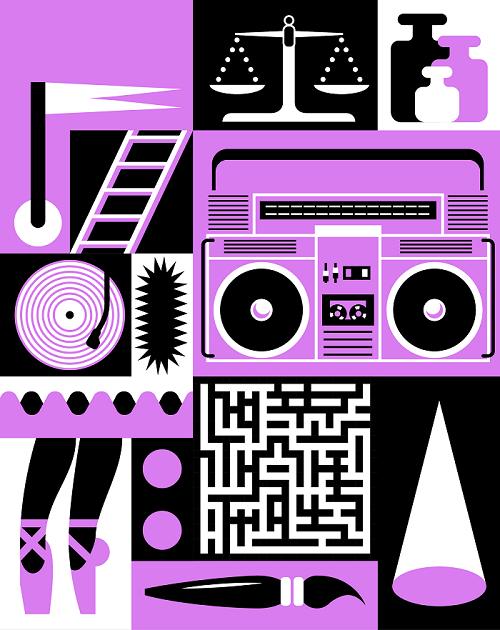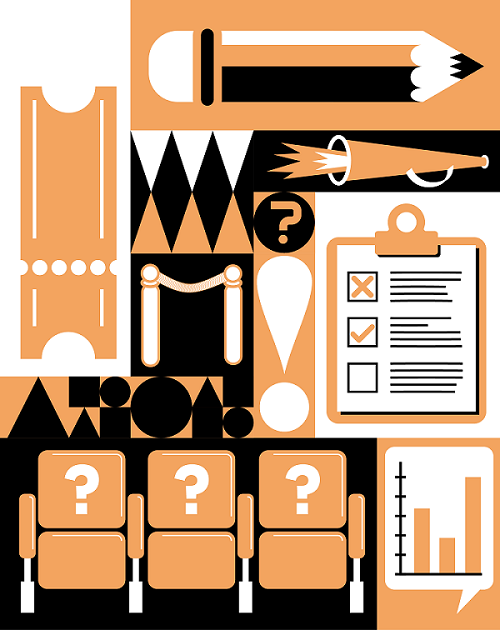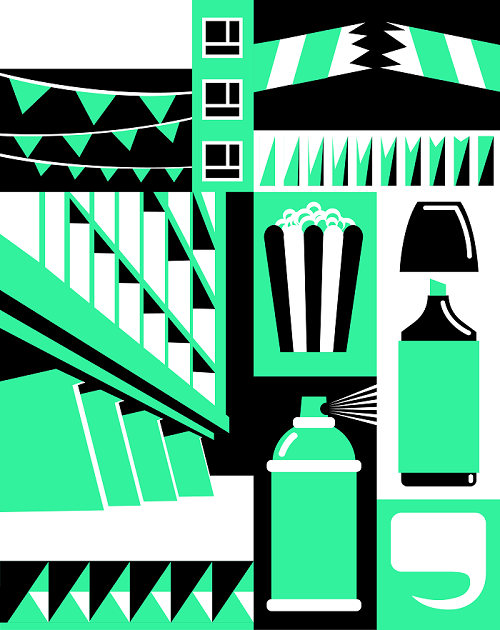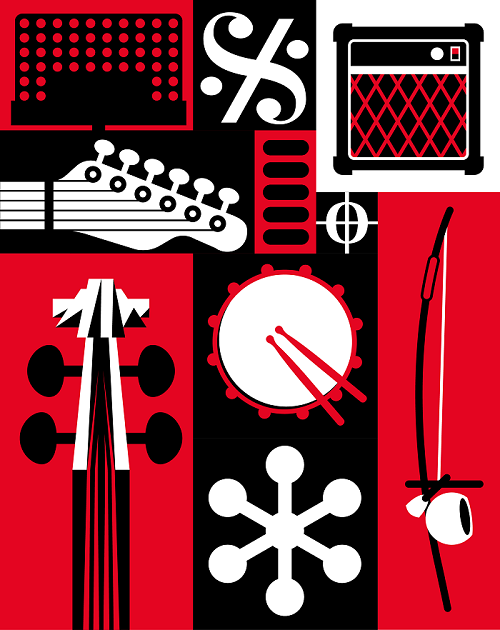-
Who we are
We are the umbrella organization for three initiatives promoting more equal opportunity in the cultural sector.
-
What we do
We advise, research and promote projects in the Berlin cultural landscape.
-
How we work
As a learning organization, we are constantly developing our working principles.
Since 2020, Stiftung für Kulturelle Weiterbildung und Kulturberatung (Foundation for Cultural Education and Cultural Consulting, SKWK) has been the umbrella organization for four initiatives that advocate for more equal opportunities in Berlin’s cultural landscape and actively shape social and cultural policy discourse on this topic.
The goal of our activities is to develop the cultural sector to reflect the existing diversity of our democratic society, in terms of its program, personnel, audience and accessibility.
The Berlin state-based foundation is supported by the Berlin Senate Department for Culture and Social Cohesion.
Diversity Arts Culture
Diversity Arts Culture is a design and consultation office for diversity development and aims to create equal access opportunities to art and culture and to reduce discrimination in the cultural sector. It promotes diversity by advising cultural institutions and administration, qualifies cultural workers, empowers cultural workers affected by discrimination and commissions data collection on equality and equal access.
Institut für Kulturelle Teilhabeforschung (IKTf)
The IKTf (Institute for Research on Cultural Participation) provides research data and reports on models by which cultural institutions, cultural policy and administration can develop strategies for cultural participation.
kultur_formen
kultur_formen consists of the Berliner Projektfonds Kulturelle Bildung (BPKB), the Berliner Projektfonds Urbane Praxis (BPUP), the model area TXL, event and qualification programs and the digital community platform Kubinaut. The focus is on the promotion and networking of projects and actors in cultural education and urban practice. In all of these projects, we work in a power-critical way. For us, this means making funding more accessible and building networks. It is also important for us to understand and change our own role as an institution within existing power structures.
servicezentrum musikschulen
The szm – servicezentrum musikschulen (service center for music schools) is currently being set up under the umbrella of the Foundation for Cultural Education and Cultural Advice. Its goal is to support the public music schools by helping to coordinate the large variety of their music classes and other activities in terms of intensity, accessibility, and quality in all of Berlin. Synergies between the music schools are to be raised while central service procedures are to be simplified.
Our teams qualify cultural workers and empower underrepresented communities in the cultural sector. We advise institutions and individuals in the arts, culture, politics, youth services and education. We conduct research on participation in the Berlin cultural landscape and build networks between science, cultural institutions, politics, administration and civil society.
Consulting
We share knowledge with artists, cultural institutions, cultural policymakers and administrations as well as with educational specialists and children’s and youth institutions.
Qualification and training
We train both players in the cultural sector and educational specialists in diversity development, cultural education and cultural participation.
Empowerment
We empower people who experience exclusion in the cultural sector and cultural education.
Scientific proposals
We provide suggestions for conceptual and data-based work in the cultural sector, through visitor and non-visitor research, cultural management research and research in the field of cultural sociology and cultural studies.
Scientific support
We research funding programs and model projects that aim for greater and broader cultural participation.
Promotion of projects
We support cultural education projects with active participation by children, teenagers and young adults.
Our work aligns with the following principles:
- We are a learning organization.
- We understand diversity as a practice that is critical of discrimination as a intersectional task.
- We design our offers to be as accessible as possible.
- For us, research, theory and practice form an essential cycle for the further development of Cultural Participation.
- Our research is collaborative, interdisciplinary and independent.
- Our perspective is intersectional.
- Our work is process-oriented.
- Exchange with, and the expertise of, marginalized actors is a central component of our work.
Arbeitsbereiche
-
Diversity Arts Culture
Diversity Arts Culture is the design and consultation office for diversity development in the cultural sector. Our goal: a
diversity-oriented structural change in the cultural sector. -
Institut für Kulturelle Teilhabeforschung
The IKTf is concerned with the question of how cultural institutions, cultural administrations and cultural policy can develop data-based strategies for cultural participation.
-
kultur_formen
We are dedicated to fostering connections among the arts, culture, youth, education and urban society, with a focus on funding, qualification and community work.
-
servicezentrum musikschulen
The szm aims to strengthen the public music schools of Berlin through a city-wide harmonization and support them in offering a broad range of high-quality music classes.
Who works in Berlin’s arts and cultural sector? Who is the boss? Who finds only underpaid jobs? How many exhibitions in Berlin museums have shown works by women in recent years? Or by Women of Color, or women with disabilities? Who is underrepresented in the cultural industry?
Berlin is diverse. However, Berlin’s cultural life does not yet fairly reflect this social diversity. Diversity Arts Culture wants to change this.
Diversity Arts Culture is the conceptual and advisory office for diversity development in the Berlin cultural sector. The project was founded in 2017 by the Berlin Senate Department for Culture and Europe to stimulate and promote diversity-oriented structural change, that is, to create equal access to art and culture for all people and reduce discrimination in the cultural sector.
What we do
We advise cultural institutions and the cultural administration on diversity issues. We develop education programs for cultural professionals, in which we teach diversity competence and strengthen artists and cultural workers who experience exclusion in the cultural sector. We also offer anti-discrimination consultation and are committed to collecting equity data for Berlin’s cultural sector.
On our website we provide information about our services, explain terms from diversity development in a multimedia dictionary, and offer numerous resources for self-study as well as interviews and articles in our magazine that show the creative side of diversity development.
Keep up to date:

The IKTf (Institute for Research on Cultural Participation) is concerned with the question of how cultural institutions, cultural administrations and cultural policy can develop data-based strategies for cultural participation. To research this issue, the Institute conducts studies on visitors and non-visitors at cultural offerings, such as population surveys. It is also responsible for the scientific quality assurance of the Berlin-based visitor research system KulMon (KulturMonitoring). Further, the Institute is studying conditions that favor participation in cultural offerings. In one example of its research methods, it closely follows model projects of cultural institutions for cultural participation and analyzes their organization/personnel, program and audience. In addition, the IKTf also surveys cultural administrations on their strategies for promoting cultural participation.
Follow us on:

As the kultur_formen team, we are dedicated to fostering connections among the arts, culture, youth, education and urban society. In arts education, all participants use artistic methods and work together on an equal footing.
Most projects are designed with and by children, youth and young adults. They contribute their own experiences and ideas to the project design and its creative processes. To ensure this exchange, we support tandem projects between arts and culture actors along with youth and education partners. We also offer qualification and training formats for future and already-experienced project leaders and other project participants. Our approach is critical of discrimination and diversity-oriented. This means that we include in our formats the knowledge and perspectives of people who still experience exclusion and are too rarely represented, especially in the arts, culture, youth and education. Our goal is for arts education projects to truly reflect the multifaceted lives, worlds and cultural practices of young people. To achieve this aim, the active group of project leaders must become more diverse. This shift is essential if Berlin’s social diversity is to be reflected in arts education.
Our work includes the fields of support, qualification, and community work. In one such area, we administer the Berliner Projektfonds Kulturelle Bildung (Berlin Project Fund for Arts Education), which has helped to achieve numerous groundbreaking projects in the field of arts education in Berlin since 2008. Further, through the community platform Kubinaut, we provide the main digital contact portal for arts education in Berlin. Another key component of our work is a diversity-oriented qualification program for actors in arts and arts education. Starting in 2021, the Berliner Projektfonds Urbane Praxis (Berlin Project Fund Urban Practice), supporting artistic projects in urban space, will expand our outreach.

Sub-areas
Through the Berliner Projektfonds Kulturelle Bildung (Berlin Project Fund Arts Education), we provide a total of at least 2.930.000 euros annually for arts and cultural projects with children, youth and young adults up to 27 years of age. Individuals, groups, associations or institutions can apply for funding for cultural education projects in which young people deal with topics that affect them through the arts. As artistically active participants, the young people help determine their projects’ scope and course.
Funding is available for cooperation projects involving at least one partner from the field of the arts and culture and at least one partner from the field of education or youth services, for example, an artist cooperation with a school or youth club.
For further information (in German) please see:
The Berliner Projektfonds Urbane Praxis supports artistic and cultural projects in publicly accessible spaces that deal with urban space and society in Berlin.
Further information:
Our qualification and events program takes a diversity-oriented, discrimination-critical approach. We offer awareness workshops, panel discussions and conferences to train project leaders and actors for work in the field of arts education. We focus on sensitizing participants to forms of discrimination that affect young people, such as adultism, racism and discrimination based on gender, sexual orientation, social/cultural origin and disability. Additionally, people affected by discrimination are supported through empowerment programs to implement their own arts education projects. In addition to our events program, we publish documentation and brochures on these topics.
The online platform Kubinaut – Navigation Kulturelle Bildung (Arts Education Navigation)is a central contact point for cultural education in Berlin. Whether as a cultural institution, youth services institution, school, day care center, artist or young person, on this site, all interested parties have the chance to present their own work, search for project partners or participants, or offer practice rooms or other services.
Everyone interested in creative work by and with young people can register on Kubinaut and post their own events, projects, advertisements or profiles free of charge. Non-registered guests can also use Kubinaut – for example, to research on artistic project formats in which children or young people can actively participate; or to find inspiration for their own work, or a new job. The numerous offers can be filtered according to districts, dates, formats and categories such as theater, museum or circus.
As editors, we publish interviews and articles by specialists, report news from the field of arts education and provide information on funding opportunities and competitions.
The Kubinaut team also organizes events for further education and networking for actors in arts education and youth work.
Kubinaut is a cooperation project of the Stiftung für Kulturelle Weiterbildung and Kulturberatung und der Landesvereinigung Kulturelle Jugendbildung (Foundation for Cultural Education and Cultural Consulting and the State Association for Cultural Education for Youth) e.V. The project is funded by the Senate Department for Culture and Europe and the Senate Department for Education, Youth and Family.
For further information (in German) please see:
The public music schools of Berlin reach around 60,000 students of all ages with a range of over 1 million units of music classes per year in all 12 districts. At around 40 of their own locations, the music schools offer extracurricular music education and cultural work as well as basic, advanced, and further musical training. The schools have developed a variety of music classes for multiple target groups. For example, they collaborate with daycare centers, schools, and other educational and cultural institutions to provide inclusive music lessons for minority populations such as refugees or individuals with disabilities. With a diverse program of events, the music schools are essential institutions for the enhancement of low-threshold and decentralized cultural work.
The service center for music schools (szm) is currently being set up under the umbrella of the Foundation for Cultural Education and Cultural Advice. Its goal is to support the public music schools by helping to coordinate the large variety of their music classes and other activities in terms of intensity, accessibility, and quality in all of Berlin. Synergies between the music schools are to be raised while central service procedures are to be simplified.
